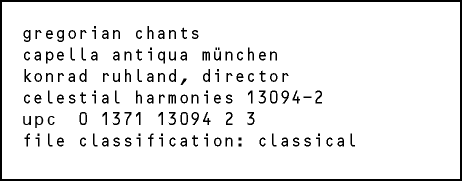 |
||||||||||||||||||||||||||||||||||||||||||
 
In einer Zeit, wo sich die Kirchen leeren, feiert der liturgische Gesang der katholischen Kirche seit Jahren ein phänomenales Comeback. Die nach Papst Gregor (um 600) benannte Kunst des (meist) einstimmigen Gesanges ist bestimmt vom Atem und der melodischen Linie. Über Tempo und Rhythmus sind sich die Experten nicht einig. Ruhland gilt als Autorität auf diesem Gebiet. Seine Capella Antiqua bietet ein reichhaltiges Gregorianik-Programm, das gut tausend Jahre von den Anfängen bis zur Renaissance umspannt. the projectIt took more than 1000 years, but Gregorian chant
has finally made its way onto the pop music charts. After the phenomenal
success of recent chant recordings, hundreds of thousand of listeners
have been introduced to the beauty and mystery of this ancient form
of singing. Gregorian chant was never meant to be a novelty item.
This is a sacred tradition that has survived centuries of turmoil
and in the past century some truly spectacular recordings of chant
have been made. The CD reissue of Gregorian Chants, by Konrad
Ruhland and the Capella Antiqua München, is a major event in the renaissance
of this timeless music.
This recording was made in Germany in 1966, by one of the finest early music groups of the century. The Capella Antiqua München performs with a precision and spirit that allows the power, the majesty, and the meditative spiritual quality of the music to shine through. In many respects, it is the definitive recording of Gregorian Chants, as it presents works from the fourth through the fourteenth centuries, including a chant by the great fourth century theorist and musician Aurelius Ambrosius, better known as Saint Ambrose. In fact, the history of this music is inextricably linked with the history of Europe in the Christian era. Another important figure in Church history, the twelfth century scholar Petrus Abaelardus (Peter Abelard), is also represented here by one of his late Gregorian chants. The style itself is named for Pope Gregory the Great, under whose direction the liturgical chants were codified in the sixth century. Despite the unprecedented public interest in recordings of Gregorian chant, this Gregorian Chants release from the Capella Antiqua München stands apart. The performances are first rate and the packaging avoids the slick, pop–music look of most recent chant CDs. The notes are by Konrad Ruhland himself, and give a useful overview of the checkered history of this music. With the careful digital remastering of this classic recording, Celestial Harmonies has insured that one of the finest performances of Gregorian chant will once again be available in an audiophile format. the artistsThe Capella Antiqua München (The Old Chapel of Munich) has recorded dozens of albums of early music. True to its name, the ensemble has specialized in the liturgical and sacred vocal music of Europe, ranging from the earliest surviving chants of the Christian era to the glories of Monteverdi and the music of the Italian and German Renaissance. Many of these recordings have never been reissued as compact disks and are still highly prized by collectors. Konrad Ruhland is the ensemble's music director in each of these records. tracklist
|
||||||||||||||||||||||||||||||||||||||||||
|
|
||||||||||||||||||||||||||||||||||||||||||
 |


